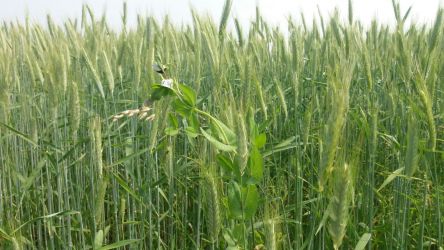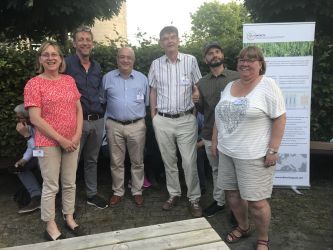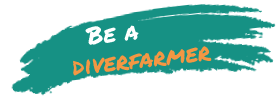Several research groups together with companies and farmers seek to increase the sustainability of European agriculture by sharing strategies and tools
The weight of the agricultural sector in Europe and the need to face the problems that stop the sector from being sustainable economically nor environmentally are part of the breeding ground that motivates the financing of projects that research in this line.
 Centred in objectives of crop diversification, protection of biodiversity, reduction in greenhouse gases and an increase in the economic security for those persons who work in agriculture, the projects of Diverfarming, Diversify, Remix, LegValue, DiverImpacts and TRUE, financed by the European Commission’s H2020 programme decided last March in Brussels to make a joint effort in achieving their goals.
Centred in objectives of crop diversification, protection of biodiversity, reduction in greenhouse gases and an increase in the economic security for those persons who work in agriculture, the projects of Diverfarming, Diversify, Remix, LegValue, DiverImpacts and TRUE, financed by the European Commission’s H2020 programme decided last March in Brussels to make a joint effort in achieving their goals.
Constituted as a group, under the denomination of “Crop diversification cluster”, representatives of the six projects studied the way to work on common aspects, agreeing to share tasks regarding the communication and diffusion of events in order to thus reach more people. The transfer of information, materials, methods and results among the different projects also enables the scope of the study to be broadened and to reach more certain and elaborated conclusions that will serve to increase the global impact of taking crop diversification on board by the European agriculture sector.
The six projects grouped in the cluster can be divided into pairs, taking common lines into account. Thus, Diversify and ReMix are focused on the benefits of the diversity of species in cropping systems and how the combinations of species can improve pest and disease control, as well as incrementing the productivity and resilience, in the face of the stress caused by external and internal conditioning factors.
For their part, TRUE and LegValue focus on how to create the best transition route towards sustainable agricultural systems based on legumes in the light of the increasing demand for legumes that is expected from now to 2050, for which it will be necessary to make more efficient use of the land and the rest of the resources such as water, nutrients and energy.
Finally, DiverImpacts and Diverfarming will work on the creation of crop diversification systems for the production of food for human and animal consumption and industrial projects seeking to achieve all the potential of diversification to improve the productivity and efficiency, from the field right through to the consumer, taking the chain of value into account.
By this association it is hoped that innovative solutions will be obtained, backed up by a network of field experiments that cover the majority of Europe, multicriteria assessment tools that show the yield of the crop diversification both environmentally as well as economically, and finally an economic and organisational approach that serves to promote business models built on crop diversification.
The common work of these groups will also generate recommendations in agricultural matters that will influence the construction of the common agricultural policy, in the form of tools that help to face up to the problems posed by today’s agriculture.
Diverfarming is a project financed by the Horizon 2020 Programme of the European Commission, within the challenge of “Food Security, Sustainable Agriculture and Forestry, Marine, Maritime and Inland Water Research and the Bioeconomy”, which counts on the participation of the Universities of Cartagena and Córdoba (Spain), Tuscia (Italy), Exeter and Portsmouth (United Kingdom), Wageningen (Netherlands), Trier (Germany), Pecs (Hungary) and ETH Zurich (Switzerland), the research centres Consiglio per la ricerca in agricoltura e l'analisi dell'economia agraria (Italy), the Consejo Superior de Investigaciones Científicas (Spain) and the Natural Resources Institute LUKE (Finland), the agrarian organisation ASAJA, and the companies Casalasco and Barilla (Italy), Arento, Disfrimur logística and Industria David (Spain), Nieuw Bromo Van Tilburg and Ekoboerdeij de Lingehof (Netherlands), Weingeut Dr. Frei (Germany), Nedel-Market KFT and Gere (Hungary) and Paavolan Kotijuustola and Polven Juustola (Finland).










